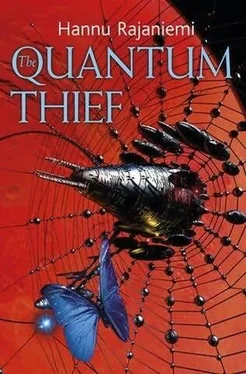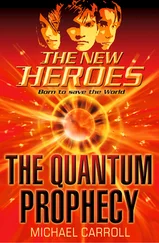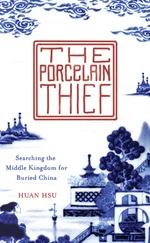Isidore folds his arms. ‘I heard a quote once,’ he says. ‘Tragedy is when I slip on a banana peel. Comedy is when you fall into a hole and die. I do wonder what I would find if I spent more time investigating you .’
She holds Isidore’s gaze for a long time. ‘I have nothing to hide,’ she finally says.
Isidore smiles, saying nothing. She is the first to look away.
‘All right,’ Odette says. ‘I suppose he could use some light entertainment.’
Unruh greets him at one of the galleries of the chateau, wearing a dressing gown and a chilly expression. Isidore sees someone walk past along a corridor, blurred by gevulot, wondering what activity the millenniaire interrupted to see him.
‘M. Beautrelet. I am told that you have discovered something.’
‘Yes. I am convinced that your concern is real, and there is an offworld force of some sort at work here. I will help you to make appropriate preparations for the party.’
‘I suppose I should thank you for not agreeing with Odette and claiming I wrote the letter myself,’ Unruh says. ‘And?’
‘Nothing. The local exomemory has been manipulated in some fashion, but I cannot determine how or by who. But that is not what I wanted to talk to you about.’
‘Oh?’ Unruh raises his eyebrows.
‘When going through the exomemory and looking for gaps, I noticed you had frequently studied the Isidis lifecast, and went back to its first appearance. I realise that I was, perhaps, abusing the powers that you had given me, but I felt it was important to study all the elements of the case from all possible angles.’
‘Indeed.’
‘I could not help noticing your… reaction to the text.’ Unruh had screamed, thrown the book across the room, flung other books from their shelves, toppled the orrery with violence that seemed to overflow his thin frame, before collapsing into a heap in his reading chair. ‘If I’m correct, soon after that you made up your mind to enter Quiet early. What was it that you saw?’
Unruh sighs. ‘M. Beautrelet, I should perhaps clarify that it is not a generic investigation you are carrying out here. I did not empower you to pry into my private life, or the reasons to my actions: merely to protect my property and my person from what I felt was a threat.’
‘You hired me because you wanted to solve a mystery,’ Isidore says. ‘And I think it was not just the mystery of the letter. I also ’blinked Count Isidis.’
‘And what did you discover?’
‘Nothing. I can’t find any references to a Count Isidis in the public exomemories. As far as the general public is aware, he never existed.’
Unruh walks to one of the gallery’s large windows and looks out. ‘M. Beautrelet, I admit I have not been entirely honest with you. A part of me was hoping you would spot certain things on your own as you have done.’ He presses a pale hand against the glass. ‘A strange thing happens when you are very rich, even when one’s wealth is as artificial as in our society. You develop a solipsism of sorts. The world yields itself to your will. Everything becomes your reflection, and after a while looking into your own eyes is dull.’
He sighs. ‘So I sought to find more solid ground in the past, in our origins, our history. I doubt there are many of our generation who have put as much effort into the study of the Kingdom and the Revolution as I have.
‘At first it was the perfect escape. So much richer than our bland existence, with real struggle, real evil, ideas triumphing over oppression, despair and hope. Count Isidis, plotting against a tyrant. Drama. Intrigue. And the Revolution! I bought memories from Time beggars. I remember being there, in Harmakis Valley, tearing Noble bodies with diamond claws.
‘But after a while I realised that something was wrong. The deeper I delved, the more inconsistencies there were. People who appeared in lifecasts I bought from black market dealers, memories that contradicted each other. The Isidis lifecast was when I had the first revelation, and you… saw how I reacted.’
Unruh clenches his hands into fists.
‘I lost my faith in the past. Something is wrong with it. Something is wrong with what we know. That is why I didn’t want you to study the texts in the library. I would not wish this feeling on anyone. Perhaps the old philosophers were right, and we are living in a simulation, playthings of some transhuman gods; perhaps the Sobornost has already won, Fedorov’s dreams are true and we are merely memories.
‘And if you can’t trust history, what should you care of the present? I don’t want any of it anymore. Merely Quiet.’
‘Surely, there is a rational explanation,’ Isidore says. ‘Perhaps you have been a victim of forgery; perhaps we should investigate the sources of your library texts-’
Unruh waves a hand in dismissal. ‘It does not matter anymore. You may do what you want with this knowledge, once I am gone. One perfect moment for me, and then I’m done.’ He smiles. ‘I’m glad I was right about le Flambeur, though. That encounter should be entertaining.’ He touches Isidore’s shoulder.
‘I am grateful, M. Beautrelet. I wanted to discuss this with someone. Odette is many things to me, but she would not understand. She is a creature of the moment, as I should try to be.’
‘I appreciate your confidence,’ Isidore says, ‘but I still think-’
‘We will say no more about it,’ Unruh says firmly. ‘The only thing you need to worry about now is the party, and our thief. Speaking of which – any security arrangements I should ask Odette to make?’
‘We could demand full gevulot disclosure at the entrance, or set up a series of agoras in the garden-’
‘How gauche! Absolutely not!’ Unruh frowns. ‘Being robbed is one thing, lack of manners another.’
10. THE THIEF AND THE SECOND FIRST DATE
Raymonde is having her lunch near the playground when we meet again for the first time. She has sheets of music in her lap and spread across the bench and studies them while eating an apple with a kind of ferocity.
‘Excuse me,’ I say.
She comes here every day and eats from a small tempmatter bag, in a hurry, as if she feels guilty about allowing herself a moment of peace. She watches the children in the high elaborate climbing racks where they move like monkeys, the toddlers playing with the round and colourful synthbio toys in the sandpits. She sits on the edge of the bench, graceful long limbs folded uncomfortably, ready to spring away.
She looks at me, frowning. Her gevulot is open just a little, showing the forbidding expression on her proud, angular face. Somehow that makes her even more beautiful.
‘Yes?’ We exchange a gevulot greeting, brief and sparse. The gogol pirate engine is scanning for gaps, but there aren’t any, not yet.
Perhonen and I looked for her in agoras and public exomemories, and after hours of work, there she was: a sudden vivid memory of a girl in a neat cream-coloured skirt and a blouse, passing through an agora, her stride purposeful. She did not wear the mask-like expression that Martians so often do in public places, but looked serious, lost in thought.
The day before I stole a sheet of music from her, wearing a different face. Now I hold it up.
‘I believe this is yours.’
She accepts it hesitantly. ‘Thank you.’
‘You must have dropped it yesterday. I found it on the ground.’
‘That’s handy,’ she says. She is still suspicious: her gevulot withholds even her name, and if I did not know her face already, I would forget it after our conversation.
She lives somewhere near the edge of the Dust District. She does something involving music. Her life is regular. Her wardrobe is modest and conservative. Somehow, that feels strange to me: it is at odds with the smile in her picture. But a lot can happen in twenty years. I wonder if she has been a Quiet recently; it usually causes young Martians to hoard Time with excessive care.
Читать дальше












